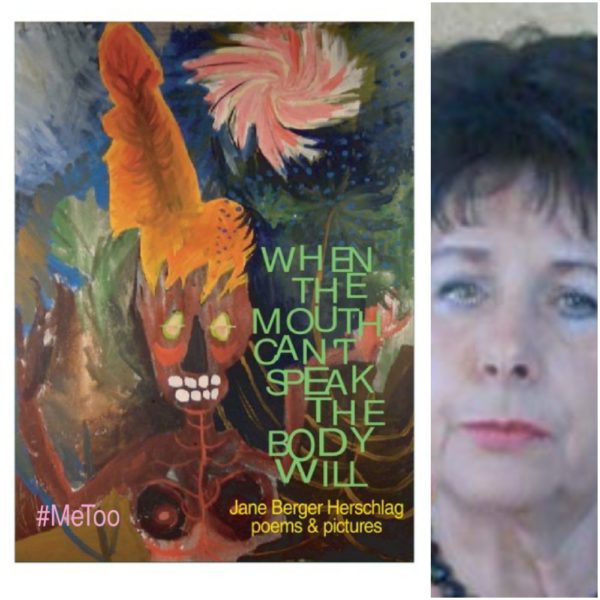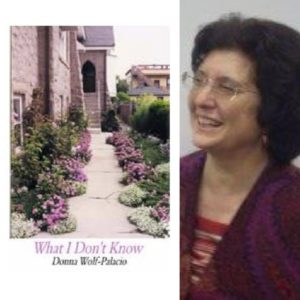Description
When The Mouth Can’t Speak The Body Will
by Jane Berger Herschlag
$19.99, Full-length, paper
978-1-63534-910-8
2019
Bully In The Spotlight, my 40 page docu-poetry chapbook is published by Pudding House Publications. My poems are also published in four anthologies and many university presses. I taught creative writing/poetry at a NYC public school and high school, and to children and adults at ESCAPE To The Arts—the Writer’s Voice at the Regional YMCA of Western Connecticut. I curated the open mic reading series for the Writer’s Voice at ESCAPE, and prior to that, for seven years at The West Side YMCA in NYC. I ran a poetry peer group from 1996-2002 in NYC, and from 2003-2012 in Connecticut. My book promo for my multi-genre memoir Tearing Off The Covers can be viewed on Youtube; after the title in quotes, add Jane Berger Herschlag, click the black & white photo of 3-year-old twins. In 2014 I won three scholarships to Writers Conference for this memoir. You can view my poetry at: Poetryjane.com. Also an award-winning photographer, a link brings you to Photographyjane.com.






Jessica –
ABSOLUTELY INCREDIBLE AND POWERFUL
Alba Esther Maya –
Dear Jane:
In our long friendship after reading your book, I am happy, proud and inspired by your journey as a person and as a poet. Your style has evolved in a wonderful profound way. This book has such bravery denouncing the institutions of family and medical profession in their brutal and cynical abuse of people in their care, mainly children and women.
Your book has moved me deeply having experience myself sexual and physical abuse at home. I am sure you give voice to countless of victims who haven’t spoken or not dare to mention their terrible secrets. Your honesty as a poet is raw, sincere and powerful and also subtle and well crafted. Despite these harrowing experiences you have found light and elegance to express these “unmentionable” truths. Your poems to nature and also to Herb, your loving and understanding artist and spouse, are beautiful. His cover and illustrations are perfect for the book, and also your love for nature
is shown in your verses and photographs. These elements give solace in the middle of so much suffering. Your book deserves an important poetry prize. With much love and respect for your accomplishments. Congratulation to both of you.
Your friend and poet
Alba Esther Maya
Rhea Becker (verified owner) –
Jane Herschlag’s poems are the kind I find myself reading and re-reading, not only for the craft, but for the searing content. Engaging, powerful, sometimes challenging to take in, the poems are testament to the art that can arise from extreme life experiences. Jane is, clearly, a talented poet but also a remarkably resilient being.
Richard Herschlag (verified owner) –
There is by definition no way to describe the indescribable, and when the indescribable is indescribably horrific there is every reason not even to try. If one tries, the result may not be cathartic to the writer, and if it is personally cathartic it may be of limited value to readers. If it is of great value to readers, the words may never actually reach those readers because the work is unfinished, or if it is finished it is unpublished.
When the Mouth Can’t Speak has cleared all of these formidable hurdles and left this reader both devastated and rejuvenated. Why a father would repeatedly rape his daughter is beyond unfathomable, whatever mundane explanations might be tried. No real attempt is made here. Instead, the author shares poetry that is as close to the wounded heart of the young victim as we should ever be allowed to see—maybe closer.
So that we are not scorched to death, the poet grows older and her understanding of her own spiraling journey of memory also grows. The emerging sophistication of her language represents a lifelong struggle to illuminate darkness, but it is three steps forward, two-and-nine-tenths of a step back.
This collection of poetry, along with some striking illustrations, is arranged to plunge the reader into deep waters but come up sporadically and then finally for air. At times the poems are capable of drowning on the level of Elie Wiesel’s Night. In both works the children beat the long odds of survival then beat perhaps even longer odds of telling the world the unspeakable details. As readers we’d like to allow ourselves the same hard won, limited joy of the salvaged child, but the ones who didn’t make it remain recessed in the dark corners of our mind, still after years, after centuries asking Why?